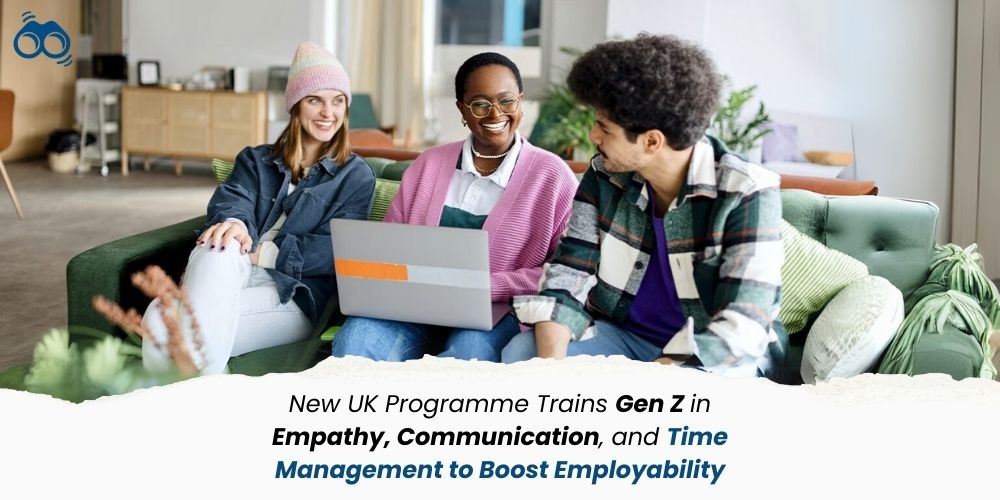New Initiative Tackles Communication and Time Management Gaps Among Young Workers
Equipping Gen Z for Success: Soft Skills Programme Targets Key Workplace Challenges
In an increasingly digital era, where technical expertise often takes precedence, the significance of soft skills cannot be overlooked. Recognising this gap, a pioneering pilot programme in Greater Manchester is set to equip thousands of Gen Z students with essential workplace skills such as empathy and time management. Developed in response to employer concerns, the initiative addresses a growing challenge among digital-native young professionals—difficulty in navigating fundamental professional interactions such as phone conversations and job interviews. By fostering these critical skills, the programme seeks to enhance students’ confidence, adaptability, and overall employability, ensuring they emerge as effective communicators and collaborators in an evolving job market.
Professor Sandeep Ranote, a leading child psychiatrist, highlighted that Gen Z—born between the mid-1990s and early 2010s—has been shaped by five major global challenges: Covid, climate change, cost-of-living pressures, cyberspace, and conflict. She believes these “five Cs” have significantly impacted the development of essential social skills. In response, the Skills 4 Living initiative was launched in Greater Manchester by the UNESCO-affiliated non-profit organisation Higher Health. Originally introduced in South Africa six years ago, this marks the programme’s first expansion beyond the African continent.
Although the curriculum will primarily be delivered online, sources confirm that students must also complete in-person assessments. The programme covers crucial topics such as fake news detection, internet safety, discrimination awareness, and protection against scams and gambling risks. Additionally, organisers will reach 10,000 young people in Greater Manchester by September, with support from institutions including the University of Manchester, the University of Salford, and Manchester Metropolitan University.
Plans are already underway to extend the programme to other groups aged 16 to 25, including young offenders, military personnel, and refugees, following a pilot this summer. Greater Manchester Mayor Andy Burnham emphasised the importance of equipping young people with the necessary skills for confident, healthy, and productive lives, noting that workplace readiness is vital for both employability and well-being. He expressed pride in Greater Manchester being the first UK region to offer this opportunity.
The programme’s UK launch coincides with industry leaders focusing on attracting and retaining Generation Z, who are expected to comprise 27% of the workforce this year. Major firms such as Deloitte and McKinsey have conducted extensive research on this digital-native generation. Additionally, Forvis Mazars, a leading UK accountancy firm, recently introduced a course to help Gen Z professionals develop social skills, including phone etiquette and client meeting simulations.
James O’Dowd, founder of recruitment firm Patrick Morgan, observed that remote work and heavy reliance on texting have left many young employees unprepared for basic workplace interactions. Similarly, a 2023 survey of 3,000 Greater Manchester employers revealed concerns about young recruits lacking key life skills such as empathy, time management, and critical thinking. Professor Ranote, chair of Higher Health UK, further noted that many companies struggle with recruits’ inability to handle face-to-face interviews and phone conversations, once considered fundamental skills.
Ranote explained that Gen Z possesses fewer essential communication skills than previous generations, largely due to the influence of social media, which she described as the “biggest cultural shift of our time.” She highlighted that their communication style differs significantly from that of older generations. As clinical director for mental health at NHS Greater Manchester, she also emphasised that improving workplace readiness among young people serves as “pre-prevention” for mental health issues. She identified climate change, career success, and relationship challenges as their most pressing concerns. Reflecting on her early career, Ranote revealed that diagnosable mental health conditions among young people have doubled from one in ten in 2005 to one in five today, describing this rise as both unacceptable and preventable. She stressed that the programme provides a practical toolkit to help young people navigate an increasingly complex global landscape.
Meanwhile, Ramneek Ahluwalia, CEO of Higher Health in South Africa and the UK, cited studies by Harvard and Stanford, demonstrating that 85% of job success depends on soft skills. He argued that while traditional education largely emphasises hard skills, today’s world demands a holistic approach that also prioritises mental well-being. The Skills 4 Living initiative represents a transformational step toward bridging the gap between academic qualifications and real-world employability, ensuring that Gen Z professionals are well-prepared to thrive in the modern workplace.
Editor's Note:
The Skills 4 Living initiative is a timely and necessary step toward preparing Generation Z for the realities of the modern workforce. While technical expertise continues to be emphasised in education, soft skills such as empathy, time management, and communication are often overlooked, despite being essential for career success. Employers have repeatedly voiced concerns about young professionals struggling with basic workplace interactions, highlighting a clear gap in professional readiness. By equipping students with these critical skills, the programme enhances their employability and fosters personal confidence and adaptability—qualities that are indispensable in any career.
According to Skoobuzz, this initiative serves as an important reminder that professional success is built not only on knowledge but also on the ability to engage, connect, and communicate effectively.














0 Comments (Please Login To Continue)